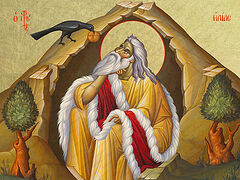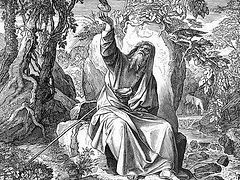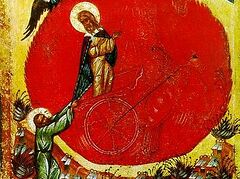In the name of the Father and of the Son and of the Holy Spirit!
Render therefore to all their dues: tribute to whom tribute is due; custom to whom custom; fear to whom fear; honour to whom honour (Rom. 13:7). The Apostle Paul addresses us with such didactic words in one of his epistles, thereby calling us to render to those above us in this earthly life what is due them. We have gathered today in the Lord’s church not to render tribute or taxes, but to render fear—that is, the highest degree of reverence, respect, and honor to him whom the Lord has placed high over us, above all the lords of the Earth—the great Prophet of God Elijah.
We offer our veneration to him today as a gift, but still our heart is filled with fear at the very reading of the book that speaks of the works of this great man—the Third Book of Kings.1 This historical book of the Old Testament narrates ancient events that occurred in the fourth century before the coming of Christ the Savior into the world. The lawlessness of the God-chosen Jewish people filled the cup of the Lord’s wrath: The wicked King Ahab and his wife—the pagan priestess Jezebel—corrupted Israel. These kings, rulers, who were called to preserve faith in the one true God, themselves began to preach a terrible and vile idolatry that involved human sacrifices, including the murder of their own children and the devouring of entrails. They taught by their example to justify immorality and corruption.
Seeing His people fall away from the truth and not desiring their ultimate destruction, the Lord sends a prophet from the city of Tishbe by the name of Elias, which means, “my God,” who boldly goes to the king as the one responsible for the sins of all of Israel and threateningly denounces him. But King Ahab, who has ruined his own soul, doesn’t hear the words of the Lord; his ears are closed by lies and self-deception, by the flattery and praise of subordinates.
But like any of us, he has something that can’t be deceived by false words and excuses—that crafty ruler beloved by all: the stomach. We know the word of the Lord: Man doth not live by bread only, but by every word that proceedeth out of the mouth of the LORD (Deut. 8:3, Mt. 4:4), but these words are for a believer who hears the word of the Lord and wants to understand, while an unbeliever is spiritually deaf and therefore hungers only for carnal and perishable food. Moreover, the main idol that Ahab and the Israelites worshiped was Baal—supposedly the patron of fertility and harvest, which means he provided his worshipers with pleasure and satisfaction.
Thus, if it’s of no avail to appeal to the hearing of sinners, then it’s worth appealing to their stomachs, which will always hear the voice of hunger and shriek with suffering. And the prophet of God says: As the LORD God of Israel liveth, before whom I stand, there shall not be dew nor rain these years, but according to my word (3 Kg./1 Kg. 17:1), and there was a terrible drought and then a famine in Israel over the course of three and a half years. The grass dried up, the forests, orchards, and vineyards died, the livestock died from lack of food, and then the people started dying. The Prophet Elias sat down by the brook Cherith at the command of the Lord, and ravens—unclean birds (anyone who touched them had to perform an ablution according to the Law of Moses)—fed him, bringing him meat and bread.
But the brook Cherith dried up, and the word of the Lord came to Elias to go to the Gentiles in Zarephath of Zidon, where he would receive food and then perform glorious and terrible deeds—deeds of admonition and vengeance of the Lord: the sacrifice on Mt. Carmel, when the Israelite people, having come to their senses after a long famine and seeing the miracle of the fire come down from Heaven upon the altar of the Living God, realized their unrighteousness and the sin of apostasy; the slaughter of 400 pagan prophets; the anointing of the king—that is, the calling of the Lord’s blessing upon the enemy of his own fatherland—Hazael, King of Syria; and the anointing of a new king for Israel, Jehu, the son of Nimshi, who would subsequently start a terrible civil war against the Israelite people; the shameful death of Jezebel, eaten alive by stray dogs, and the death of Ahab himself by a Syrian arrow.
Elijah’s fiery faith and courage, his zeal for the righteousness of God, found no place on Earth or among his tribesmen. “There is no prophet in his own country”2 it is written;and he was taken alive to Heaven to come, according to the word of the Lord, when the wickedness of men will again overflow the cup of God’s long-suffering. He will come and preach the truth amidst the darkness of godlessness and lies and he will be killed, but he will rise again and ascend into Heaven.
Great is our Lord, brothers and sisters, Who sends us great prophets. He changes the laws of nature, He changes the Law given to His people: The impure bird ceases to be impure and a righteous man receives food from Gentiles; the widow of Zarephath’s oil and flour don’t run out; the dead are resurrected and Heavenly fire burns the enemies of God’s truth.
But it is a fearful thing to fall into the hands of the living God (Heb. 10:31). It is a fearful thing to become an enemy of God! It is a fearful thing to make your belly your god and to serve it! It is a fearful thing to forget our Creator; it is a fearful thing not to hear His words! Who knows, maybe we’ll met the Prophet Elijah in this earthly life; maybe he’ll come to our home for food, as he once did to the widow of Zarephath; and in receiving the Prophet, we will receive the honor of a prophet (cf. Mt. 10:41).
But as long as the Cherith continues to flow, the time of earthly history—the history of mankind—continues, and he, Elijah the Tishbite, awaits the word of God. We must be ready for his coming, not desponding, but rejoicing in the Lord Who has promised us: Fear not, little flock; for it is your Father’s good pleasure to give you the Kingdom (Lk. 12:32). And today we will offer fear and honor to the great prophet of God Elijah, remembering the words of Jesus, son of Sirach:
O Elijah, how wast thou honoured in thy wondrous deeds! and who may glory like unto thee! Who didst raise up a dead man from death, and his soul from the place of the dead, by the word of the most High: who broughtest kings to destruction, and honourable men from their bed: who heardest the rebuke of the Lord in Sinai, and in Horeb the judgment of vengeance: who anointedst kings to take revenge, and prophets to succeed after him: who wast taken up in a whirlwind of fire, and in a chariot of fiery horses… Blessed are they that saw thee, and slept in love; for we shall surely live (48:4-9, 11).
Amen.




